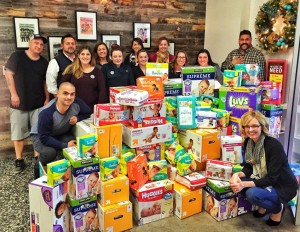The Indian Wells Valley Annual Economic Outlook Conference was held last Thursday in the high desert city of Ridgecrest (pop. 27,616) Kern County. This is the 28th year of the conference, and it was unusually well attended with over 400 participants, drawn from throughout the China Lake and greater Valley region.
 One of the featured speakers was the owner of a rapidly growing business in the Sacramento Valley, Gordon Fowler. In his talk, Fowler spoke of his experiences starting and operating a business in California, and especially of the “community-linked entrepreneurship” movement in California, and its presence among California’s millennials.
One of the featured speakers was the owner of a rapidly growing business in the Sacramento Valley, Gordon Fowler. In his talk, Fowler spoke of his experiences starting and operating a business in California, and especially of the “community-linked entrepreneurship” movement in California, and its presence among California’s millennials.
Fowler is a former state employee, an alumnus of the state Employment Development Department (EDD). He worked at EDD from 1994-2001, before leaving in 2001 to be the Communications Director for the association of workforce practitioners, NASWA, in Washington DC. In 2004, he decided to strike out on his own in Sacramento with 3fold Communications, a public relations/advertising firm in midtown Sacramento. “I started with $10,000 and 90 days of savings in the bank”, Fowler recalls.
Today 3fold is up to 22 employees. It is headquartered in a former Wells Fargo bank building on the corner of 21st and K, in Sacramento, and has a branch office in North Highlights. Its clients include major private businesses, non-profit organizations and economic development agencies.
As 3fold Communications has grown, Gordon has developed ideas on the role of entrepreneurs in California, and the link between a business and the local community. He notes that despite the business friendly rhetoric throughout the state, taxes and regulations remain high and “rules, regulations and processes set up decades ago do not translate well into the real pace of business today and a technology infused business environment.” He is engaged in continued efforts to reduce government obstacles, and give greater opportunity to the entrepreneurial energies and talents in California.
 While entrepreneurs should not be held back by government, though, he sees the California entrepreneur as voluntarily building a close tie to his or her local community—volunteering in local charities, providing expertise to solve local issues, . Fowler frames this as both a moral imperative and a bottom line contributor.
While entrepreneurs should not be held back by government, though, he sees the California entrepreneur as voluntarily building a close tie to his or her local community—volunteering in local charities, providing expertise to solve local issues, . Fowler frames this as both a moral imperative and a bottom line contributor.
In a recent article in Comstock Magazine, Fowler outlines his theory of the “community-linked entrepreneurship”. Fowler writes, “Your physical address isn’t just the location where you business is stationed, it represents the community where your team, customers and partners live and hopefully, thrive. Demonstrating your dedication to the community not only shows you’re invested in the lives of your employees, it shows you’re invested in the success of the entire business community. And when you show you’ve invested, that investment will often return tenfold.”
3fold Communications has a long list of community involvements, starting with its own workspace, which it opens to the mid-town neighborhood for meetings and local events. The state of the art conference area (floor to ceiling white-board space, casual couches, meeting areas) was designed to accommodate community groups, and Fowler estimates that the space is used 8-10 times a week for community events.
3fold tithes 10% of its revenues to local community and non-profit organizations, and requires all employees to serve on a nonprofit board or committee (local food bank diaper drive above). Philanthropic activities are part of individual and team assessments, and in early 2015 3fold employees serve on over 20 nonprofit boards. As Fowler explains, “Community engagement leads to economic development, not just for the participating businesses—but for the surrounding community.” Fowler finds the community engagement also to be a plus in recruiting and retaining employees: “Although we are growing and need to fill positions on our team, we haven’t advertised or recruited for a job posting in the past 6 years because of the steady stream of prospective team members who are attracted not only to the work environment, but also to our mission.”
Finally, Fowler sees in the millennials a source of greater community entrepreneurship than previous generations: “The good news is that entrepreneurship comes more easily to millennials, and inherent within the DNA of those entering the workforce today is a strong sense of social mission and community contribution—in fact they are demanding it.”

